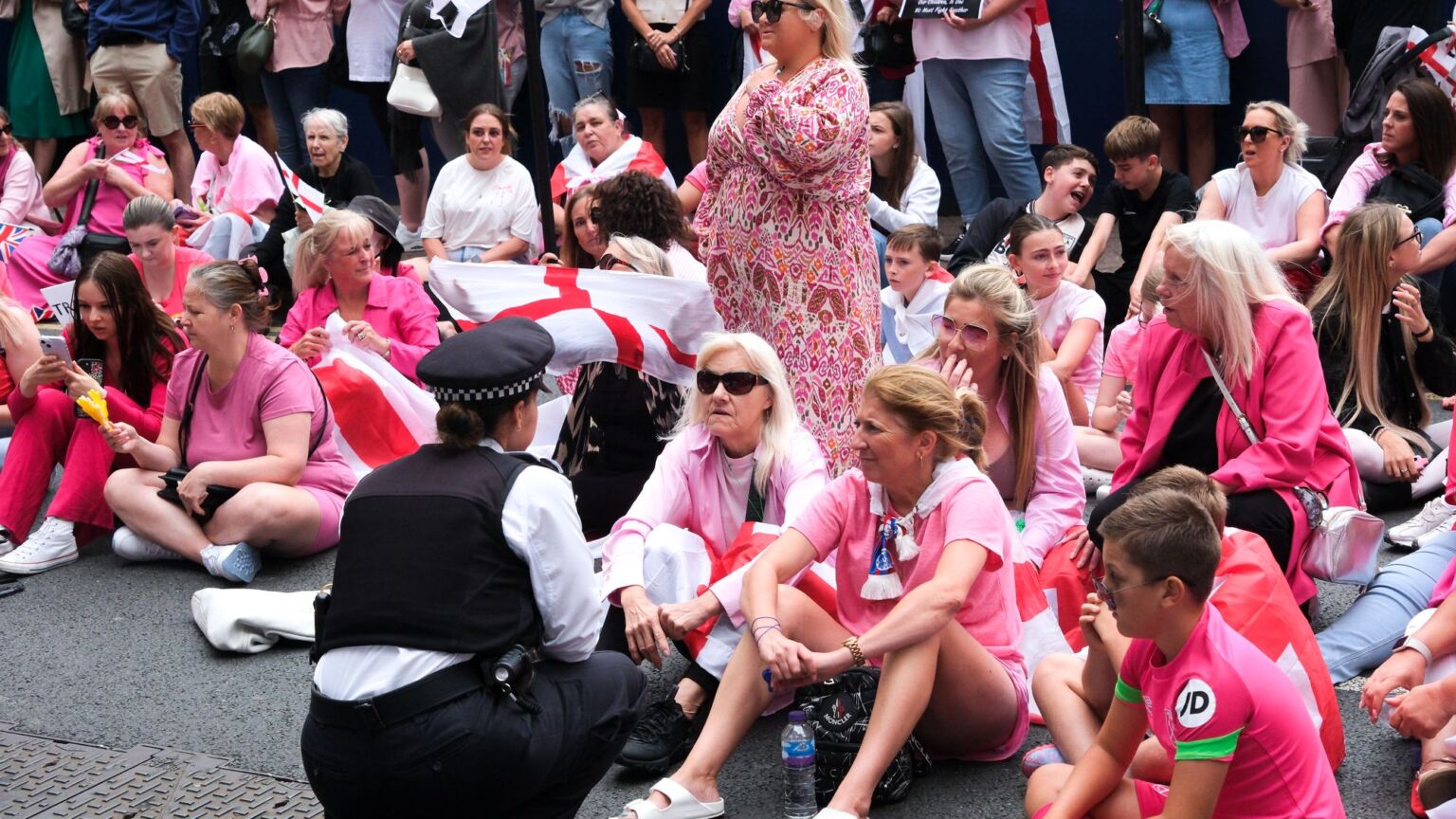Mums are in revolt against illegal migration
The pink ladies’ protests outside asylum hotels capture the fury of a forgotten, disdained majority.

Want unlimited, ad-free access? Become a spiked supporter.
In recent weeks, two types of women in revolt have been sighted on the streets of Britain, defined by opposing outlooks and experiences. One group rails against Israel, the other objects to illegal immigration.
What they have in common is their sex. They are mothers, wives, grandmothers, but there the similarities end. What divides them is class.
Provincial middle-class protesters have become a spectacle in a market town in Somerset, a county colonised by the Lib Dem vote perhaps more than any other. In the market square of Wells, the smallest city in England, they gather on Saturday mornings banging pots and pans, accompanied by a sandwich board calling for sanctions on Israel, much to the annoyance of the stall holders attempting to earn a living. That’s not an issue for this handful of women, as they’ve passed pensionable age. Two of them, former teachers, returned to Wells as conquering heroes following their arrest at a rally in support of Palestine Action in Cardiff, with their adventurous day out becoming a major story in a minor local newspaper.
These are the same ancient activists who block roads for Just Stop Oil, or cling to ‘Refugees Welcome’ signs between bread-making classes. A type as I say. They shop at Waitrose (while boycotting the Israeli goods), they buy shapeless tops from Seasalt and sport hairstyles that belong on Colette or Mary Beard. The women of Wells on pan duty for Palestine wear a shade of burgundy reminiscent of that required by devotees of the bygone religious cult of free love, Rajneeshpuram.
‘Who radicalised Nan?’, began Tom Slater, when examining this breed of silver-haired female activists in the Telegraph recently. It’s a type, a trend, a cult. Rumour has it that there have been sightings of similar women, of a similar age, armed with similar pots and pans, in similar settings. But larger crowds of females from another class with their own pressing concerns are evident in other towns and cities, swelling in numbers with each passing week.
In London’s East End, working-class women taking to the streets don’t have the luxury of returning to rural middle-class homes after a day of demonstrating. What needles them, what has propelled them to protest, doubtless for the first time, is an immediate threat that’s on their doorstep: illegal immigrants housed in hotels and buildings on the streets in which they have spent their lives.
These women are all ages. The younger are accompanied by their children, with the elders supported by walking sticks, frames, wheelchairs and mobility scooters. They are captured on camera doing the conga, breaking into a rendition of ‘Maybe it’s Because I’m a Londoner’, holding a sit-in outside the Britannia Hotel in Canary Wharf on the Isle of Dogs. These happenings followed in the wake of protesters congregating outside the Bell Hotel in Epping, a postcode familiar to those who were part of the diaspora when East Enders made the voyage out to Essex, to become home owners.
Events in Epping have pressurised the district council to apply for an injunction to close down the asylum hotel, but this is yet to be acted upon. In Westminster, government ministers have been silent on the impact of these protests, and those in Waterlooville, Diss, Bournemouth and elsewhere. This is also true of the mainstream media, leaving a clearing for citizen journalists, activists and GB News reporters to cover the story.
Beyond the Labour government’s silence exists a sinister attempt to censor these protesters and prevent similar events – largely using the Online Safety Act, which introduced age restrictions on content in July, having been passed into law by the Conservative government in 2023. The police at these protests threaten those gathered with arrest for public-order offences that could result in lengthy sentences. This further confirms the two-tier policing operation that takes a far softer approach to counter-protesting interlopers – from other postcodes, other classes – masked by balaclavas and keffiyehs.
The face coverings conceal the identity of ‘Antifa’ activists who are as interchangeable as the marches and counter-demonstrations they join to bring about disruption and confrontation. They lack the impetus that has roused the women assembling with local men outside asylum hotels throughout the country. They are motivated by the detrimental impact an influx of strangers will have on their neighbourhoods and on local services. As one of the organisers of the Canary Wharf demonstration is quoted as saying, they are well aware that not all these migrants are paedophiles or rapists, but they are unwilling to ‘play roulette’ with their children’s lives.
The women returning to protest at Canary Wharf have earned the title ‘pink ladies’, because they turn up wearing assorted pink garments, which bring a softer, amenable look compared with the cult of the ancient sisterhood in a certain market town. Yet they are referred to as ‘far right’ by left-wingers who have never lived in the streets native to these women, and never will. In response to the predictable name-calling, they march behind a banner bearing the words: ‘We are not far right but we’re not far wrong. Stop the boats.’ Yet still the slurs occur. At the prospect of a protest in Bristol, Carla Denyer, MP for Bristol Central and co-leader of the Green Party, declared:
‘Today a far-right protest is expected to take place outside a hotel housing asylum seekers in Bristol. Let me be clear: the far right are not welcome in Bristol. They don’t represent us, or what we stand for.’
Arguably, the politics and pedigree of a middle-class woman like Denyer, daughter of a scientist mother, with a father who worked for the Ministry of Defence, do not represent the majority of Britons – particularly the working-class women taking to the streets of the East End.
The attacks on these women, and the men they march alongside, are reminiscent of the verbal assaults on Leave voters who triumphed in the EU referendum from middle-class Remainers, hinting that the background and social status of the victors should have prevented them from having a say. It’s an attitude that goes back even further, to the age when Matthew Arnold popularised the term ‘populace’ in the 19th century, and later when the poorer classes from the London docks took to West End streets, flags raised, to celebrate the relief of Mafeking in South Africa, following a seven-month siege during the Boer War. One observer compared them to ‘rats emerging from a sewer’.
Centuries pass, times change and still the bleat goes on. Figures from the left post their reactions on X to the recent protests, referring to these characters as the worst of Britain, as jobless scroungers and benefit cheats. Leading trade unionists not only support those antagonising these working-class men and women, but also reputedly fund them. At an Epping protest, Ed Harlow, vice-president of the National Education Union, addressed the ‘Stand Up To Racism’ demonstrators with a comical, tone-deaf speech that knowingly overlooked the class and concerns of the locals protesting nearby: ‘The enemies of working people in this country are not staying in hotels in Epping. The enemies of people in this country are floating around the Med on super yachts.’
Among those relevant to the new trade unionism of the late 19th century were the unskilled ‘matchgirls’ from the Bryant & May factory, who famously went on strike for better working conditions in 1888. Then as now, East End local working-class women are taking on a contemporary challenge. One that they are generally fighting alone, with an absence of support from women from other parts, other classes. Many, but not all, feminist writers and pundits from the middle class and upwards, rightfully forthright on misogyny and male violence, are silent on the hotels issue.
To their detractors, the women protesting are as much a type as the provincial middle-class women wearing Crocs and banging pots in the West Country. If so, it’s a type many of us salute. Their voices, accents and histories are familiar to us, as are the streets they walk and the city that formed them. The elders among these women are from the last generation of men and women who witnessed or were privy to harsh times, deep struggles and a conflict that saw the East End ablaze during the London Blitz. They have buried parents, husbands and maybe children long before their time. This might be their last battle, but it’s one they won’t retreat from.
For the younger ones it could be the first fight of many, in a city in which they have been discarded, and their history erased, by officials who hold them in contempt, and a London mayor who continues to cart around the washed-up corpse of multiculturalism, while ignoring key issues that are destroying the nation’s capital.
These women, these men, are part of a silent majority seeking a voice, just as their distant relatives and ancestors were, for other reasons. They have been stirred into action. Something has been awakened in them and their number elsewhere. It may be the beginning of a new dawn. As Edward Carpenter wrote in his famous ‘Socialist Marching Song’ from 1886: ‘England, arise! the long, long night is over.’ Or it may be the last gasp of a diminishing people in a dying nation. But if they’re going down, they’re taking this ship with them.
Michael Collins is a writer, journalist and broadcaster. He is the author of The Likes Of Us: A Biography of the White Working Class.
You’ve hit your monthly free article limit.
Support spiked and get unlimited access.
Support spiked and get unlimited access
spiked is funded by readers like you. Only 0.1% of regular readers currently support us. If just 1% did, we could grow our team and step up the fight for free speech and democracy.
Become a spiked supporter and enjoy unlimited, ad-free access, bonus content and exclusive events – while helping to keep independent journalism alive.
Monthly support makes the biggest difference. Thank you.










Comments
Want to join the conversation?
Only spiked supporters and patrons, who donate regularly to us, can comment on our articles.